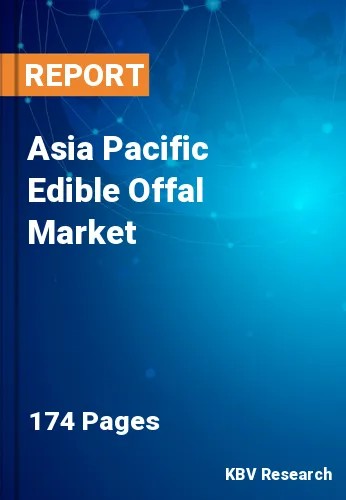The Asia Pacific Edible Offal Market would witness market growth of 5.1% CAGR during the forecast period (2023-2030).In the year 2021, the Asia Pacific market's volume surged to 5,420.9 Kilo Tonnes, showcasing a growth of 2.6% (2019-2022).
As edible offal contains numerous nutrients like minerals and vitamins, certain organ meats, such as liver, have been associated with potential health benefits that exceed those associated with basic nutrition. This aligns with the current trend of seeking functional meals with health benefits. Beef liver is currently one of the best organ meat accessible, there are only a few foods that are healthier than this. Although livestock organ meat is the finest source of vitamins and minerals, pork and chicken livers also make excellent options.
Furthermore, the liver provides those nutrients that are difficult to obtain elsewhere. Beef liver is one of the limited naturally occurring sources of copper that can be beneficial because copper deficiency can result in blood insufficiency (anemia). Similar to the liver, the kidneys have a similar nutrient profile. As a result, they also have unusually high selenium contents. This anti-inflammatory mineral lower cell stress and has antioxidant properties.
Offal consumption in the Asia Pacific region is widespread and deeply rooted in many traditional cuisines. Offal is a significant part of Chinese cuisine. Dishes like "hongshao niurou" (braised beef tripe), "gongbao huiguan" (spicy fried chicken gizzards), and "chou doufu" (stinky tofu) are popular examples. In Japan, "horumon" refers to grilled or stewed offal dishes, including liver, intestines, and stomach lining. "Yakitori" skewers often include chicken heart and liver. Offal dishes are popular in Korean cuisine. "Gopchang gui" features grilled beef or pork intestines, while "sundae" is a type of blood sausage. Offal is commonly used in Indonesian cuisine. "Soto" is a type of soup that may include offal and "sate babat" features skewered tripe. More consumption of these cuisines will influence the expansion of the market.
The China market dominated the Asia Pacific Edible Offal Market by Country in 2022 and would continue to be a dominant market till 2030; thereby, achieving a market value of $7,923.5 million by 2030. The Japan market is registering a CAGR of 4.4% during (2023 - 2030). Additionally, The India market would showcase a CAGR of 5.8% during (2023 - 2030).
Based on Application, the market is segmented into Processed (Canned/Brine, Frozen, Sausage/bagged and Others) and Fresh. Based on Distribution Channel, the market is segmented into Food Service and Retail (Hypermarkets/supermarkets, Wholesale Stores, Online Sales and Others). Based on Source, the market is segmented into Pig, Goat, Sheep, Cattle, Poultry, Horse and Others. Based on countries, the market is segmented into China, Japan, India, South Korea, Singapore, Malaysia, and Rest of Asia Pacific.
Free Valuable Insights: The Worldwide Edible Offal Market is Projected to reach USD 58.2 Billion by 2030, at a CAGR of 4.7%
The market research report covers the analysis of key stake holders of the market. Key companies profiled in the report include Vion N.V. (Stichting Administratiekantoor SBT), Hormel Foods Corporation, Itoham Yonekyu Holdings Inc.,JBS USA Holdings, Inc. (JBS S.A), Marfrig Global Foods S.A., NH Foods Ltd., OSI Group, LLC, Sysco Corporation, The Kraft Heinz Company and Cargill, Incorporated
By Application (Volume, Kilo Tonnes, USD Million, 2019-2030)
By Distribution Channel (Volume, Kilo Tonnes, USD Million, 2019-2030)
By Source (Volume, Kilo Tonnes, USD Million, 2019-2030)
By Country (Volume, Kilo Tonnes, USD Million, 2019-2030)
Our team of dedicated experts can provide you with attractive expansion opportunities for your business.

